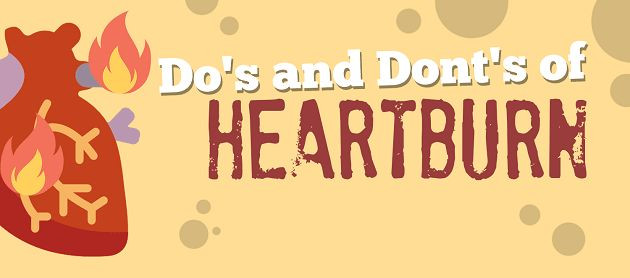Heartburn is a condition that often leaves a bad taste in our mouths, and we don't mean just in the figurative sense. It occurs most often after you've just consumed a large meal, especially one that goes heavy on fatty and greasy foods. As webmd.com puts it, foods high in fat sit around in the belly longer, triggering our stomach to produce more acid, which in turn irritates our digestive system. We feel heartburn when stomach acid goes in the wrong direction, flowing back up into our esophagus, creating a burning sensation in the throat or chest. Occasional heartburn is fairly typical, perhaps occurring several times a month, or just around the holidays, and usually after a heavy meal or at least one that is particularly spicy and/or greasy. However, heartburn is rarely a major cause for concern; it is fairly common. According to the American College of Gastroenterology, via medicalnewstoday.com, about 15 million Americans are experiencing heartburn on any given day. If you happen to get it today, you are not alone. Per rxlist.com, heartburn is a symptom of gastroesophageal reflux disease, better known by its acronym, GERD. A bout of heartburn doesn't necessarily mean you have GERD, although its recurrence over a long period of time warrants a trip to your physician for a checkup and consultation. Heartburn can lead to complications such as long-term inflammation of the esophagus that can produce small segments of tissue breakdowns; these are known as ulcers that can eventually be accompanied by serious internal bleeding.
Other Causes of Heartburn
It's not just stuffing ourselves with fatty, spicy, and/or greasy foods that can produce heartburn; other consumable irritants can accomplish the same, per rxlist.com:- Alcohol
- Caffeine
- Aspirin
- Carbonated beverages
- Acidic juices, such as grapefruit and pineapple juice
- Acidic foods, to include tomatoes and oranges
- Chocolate
- Smoking
- Pregnancy – it can be accompanied by increased pressure inside the abdominal cavity, making it susceptible to acid reflux.
Treating Heartburn
If heartburn is more than just an occasional annoyance for you, perhaps solved with one or two antacid tablets, it's time to see the doctor. A lifestyle and dietary change could be in store, as well as medicines such as proton-pump inhibitors (PPIs) or histamine-2 blockers. Here are some other tips for quick heartburn relief, per healthline.com:- Loosen tight clothing – it could be binding your stomach and therefore stimulating the release of excess stomach acid. Think belts, apron ties and dresses or pants that might be too snug, even if fashionable. Looking swell might lead to not feeling well.
- Stand up, straight – just like your parents or even teachers used to tell you. No slouching. Walking hunched over can compress your internal organs.
- Mix baking soda with water – It can help alleviate heartburn by neutralizing stomach acid.
- Chew gum – it can help neutralize stomach acid as well. Chewing gum stimulates your saliva glands to help wash away a buildup of acid.
- Don't lie down after eating – this can exacerbate the problem. At least position yourself so that your head and stomach are elevated above your waist.
- Try over-the-counter (OTC) remedies. There are dietary supplements that can also work well. Note: calcium has been identified as a worthy opponent for heartburn.
Heartburn: Do's and Don'ts Infographic
Please include attribution to Positive Health Wellness with this graphic.

